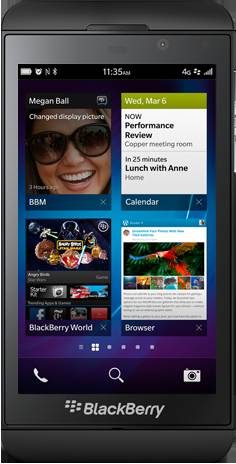This article is more than 1 year old
BlackBerry bets fans are willing to upgrade skills
New Z10's slippery bottom needs a firm hand
First Look BlackBerry OS 10 is slick, fast, usable and oozes potential, but is sufficiently different from previous that users of older BlackBerries won't see an upgrade as a natural choice, based on what we've seen so far.
That means the company's greatest strength – millions of users, many of them very enthusiastic – is somewhat negated by the new platform. The Reg makes this assessment after using the new Z10 handset for around ten minutes at its Australian launch today. The Q10, which boasts a QWERTY keyboard, was not on show.
It's the the Z10's posterior that's most noticeable at first, as the rear of the handset is covered in dimpled plastic that felt slightly greasy to the touch, but not unpleasantly or drop-inducingly so. A BlackBerry staffer explained the backing is intended to stop the phone slipping off one's desk. We're not aware of sloping desks being prevalent beyond the profession of drafting, so perhaps a car's dashboard is where this feature will shine.
It's also hard not to notice the Z10's tight build. Panels of white and black plastic come together seamlessly, a word we're using here in its strictest definition. The white Z10 is sufficiently stylish that it will not look out of place emerging from a designer handbag. That's just what BlackBerry wants: local officials said the company is determined to shift its user base from the current proportion of 66/33 enterprise/consumer to a more consumer-heavy population.
The lure for average punters is an interface based on a home screen that can be filled with eight application shortcuts. A leftwards swipe from that screen produces “the hub”, an app that aggregates all messaging services, be they BBM, email or social networks.
It's possible to access the hub from any app, at any time, without the need for opening or closing apps. BlackBerry is very keen to let it be known this arrangement beats other smartphone OSes when it comes to glancing at messages. It's hard to disagree with that assertion, as rival systems like the iPhone's notifications require users to quit and restart apps.

The BlackBerry Z10
Beyond the hub and the customised apps screen lies a conventional gridded display of apps that will be instantly familiar to anyone that has used an iPhone or Android device in the last five years.
Less familiar is the need to swipe in from beyond the bezel to access some features. Doing so from the top of the phone invokes a collection of configuration options, including a feature called “Balance” that allows users to set up a walled garden within the phone. On one side lies personal data and apps. On the other, businesses can curate the phone so it can access only approved apps and network resources.
Balance is BlackBerry's Bring Your Own Device (BYOD) play. The company said it does not fear BYOD but hopes to excel at it. And of course sell some enterprise software along the way. Our glimpse of Balance suggested it is at least comparable to the likes of VMWare's Project Horizon in intent.
Typing on the Z10's virtual keyboard was easy and accurate. Blackberry says the new handset will learn users' fat-fingered foibles, so those who inadvertently mash more than one key will be treated kindly as the handset figures out what you they are likely trying to type. The phone also tries to predict the word you are about to type and will enter it if the first letter of that word is flicked upwards.
In our brief time with the Z10 it was clear the phone will be a contender, and that's how BlackBerry sees it. Australian executives said they hope to grab the number three spot for smartphone OSes, and they believe that spot is achievable. No Android or iOS-slaying ambitions were voiced.
Overall, the Z10 and BlackBerry OS 10 were pleasing and just a little intriguing. While the various elements of the UI all require users to learn a slightly different set of skills, the experience of moving between different modes was not as jarring or disruptive as is the case with Windows 8.
BlackBerry, for what it is worth, says that a clean break was necessary as its previous OS became impossible to extend or enhance. Officials also said they think iOS and Android are rapidly reaching the same status and that innovation on both platforms will soon slow, leading handset-makers stuck in the kind of scrape BlackBerry found itself in before embarking on development of BBS10. A staffer we challenged on this point said it is not a mere puff, but a lesson hard-won from BlackBerry's own experiences.
Whether firm fans of the company are willing to take the steps BlackBerry says are vital remains to be seen. Our brief time with the Z10 suggests they certainly wont go backwards if they choose the new phone. That might just be enough for BlackBerry, too. ®
